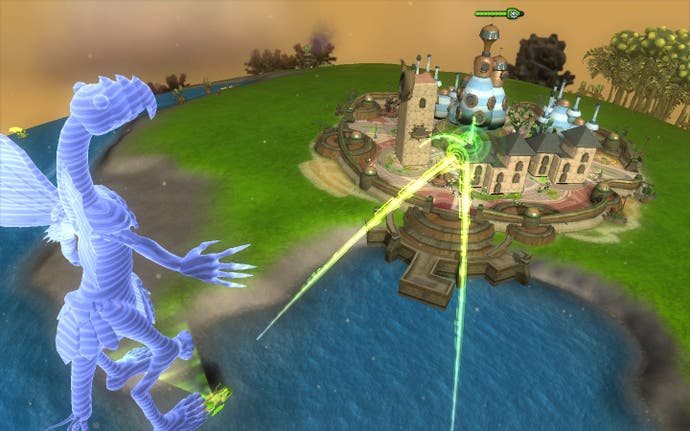Bungie's Damian Isla
Bungie's AI guru on the thinking behind Halo.
Absolutely. Yes. One of the biggest changes between Halo 1 and Halo 2 was the amount of physical simulation that happened. People don't really remember this, but in Halo 1, there were tons of space crates - little objects, movable cover and so on - that littered these spaces, but none of them moved. They were all completely static.
In Halo 2, we had this really nice idea - oh, let's make all that stuff dynamic! So then it got thrown about by explosions and so on. That was incredibly complicated for AI, because all of a sudden, these spaces that had been wide open and fairly intelligible became a disaster as soon as gameplay broke out around it. The AI had to be much better about navigating around dynamic obstacles, and it had to deal with a whole other order of magnitude of clutter in those spaces.
We also worked on their physical abilities. We gave them the ability to vault over objects, or to hoist on top of objects - even to smash objects out of the way, that kind of thing. I find that sort of level of interaction with the physics very exciting... But it's also very, very hard. We'll always have more work to do, that's for sure!

It's funny, because in a lot of ways the next step for AI is animation. Which is to say that AI has developed to a point where a lot of the big problems that we're solving are not really AI problems at all, they're animation problems.
In the past, historically, AI has had only a very high level interaction with its own body. It has said, "go in this direction and play this animation", and hasn't really had much freedom to say, "this is how you play this animation, and this is how you move in this particular direction". What we need to see is a much greater integration of AI and animation, in order to deal with much more dynamic environments.
The example that I give to a lot of people is that we have yet to see an AI, or any kind of character in a videogame, that can walk up to a table and pick a pencil off the table. We literally don't know how to do that, because it's such an incredibly complicated process.
I have to get my hand just to the right place, I have to approach the pencil with the right shape of hand, I need to approach it from the correct trajectory... And lifting a pencil off the table is going to look completely different from lifting a bowling ball off the table! I'd have to position my entire body for that one!
In other words, picking something off the table is as much an AI problem as it is an animation problem. I have to communicate to my body how heavy I expect this thing to be, that kind of thing... So a lot of decision making goes into working out how to do physical actions.
We're really running up against that. We've been trying hire an animation engineer for the longest time, and the funny thing is that very few engineers want to do animation. Everybody wants to do AI - that's really surprising to me. I've been telling them, "no no, you think you want to do AI, but you really want to do animation!" - because these days, all the interesting AI problems are in animation, rather than AI.

I think so, and I think we're already seeing stuff... Like Spore, for example, is a fantastic piece of work, because they've started to do this. They've started to take a much more procedural approach to animation.
I think between that, and seeing the fantastic animation work of a game like Call of Duty 4, for example... All of that is really inspiring. People are realising this, and we realised this a couple of years ago. We're working on this area very intently.
I don't think it's a question of processing power, I think it's a matter of the development of our own ideas. I think we need to do some fairly fundamental scientific research into all of this stuff - for a start, how do we do it? Academics have been working on this for many years, and we've entered into a series of collaborations with academics to look at what we know about animation, and how we can synthesise animation out of simpler pieces.
It goes right down to the neurology of it. When I reach for the pencil, that's not my brain that's doing that, it's my spinal cord - or at least, my spinal cord as much as my brain. So how does the real brain actually solve these problems? We have to be thinking about all of this stuff.

Oh yes. You know, it's one of the classic problems of AI - the things that people think are hard to do, are actually easy. The things that people think are easy, are the hard problems. Everyone thinks, intelligence... Well, what about chess? Chess is really intelligent. From an AI perspective, though, it was a solved problem 30 years ago, and now we're beating the grand masters.
Chess, really, is not that difficult a problem to solve. Walking up to a table and picking a pencil - that's impossibly difficult, and we don't know how to do it! There's an interesting dichotomy between what appears hard, and what actually is hard.
Absolutely. It's the curse!








